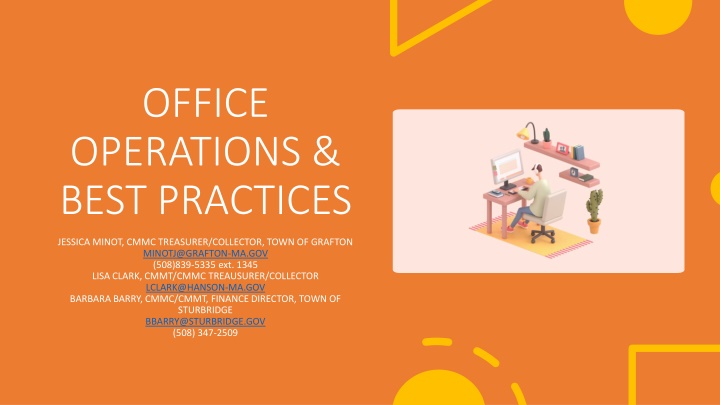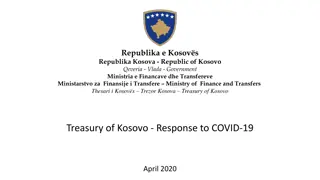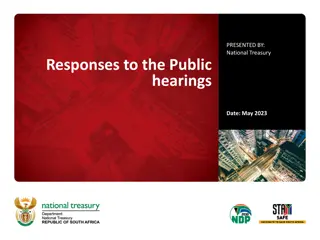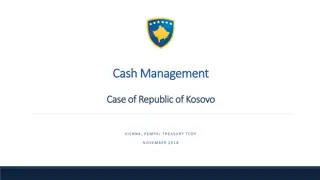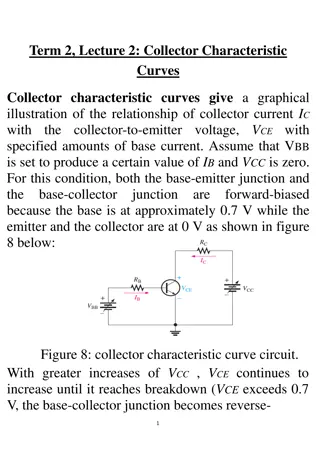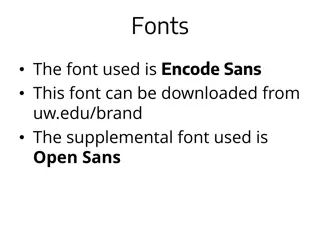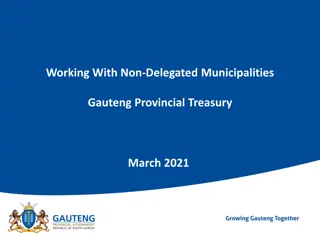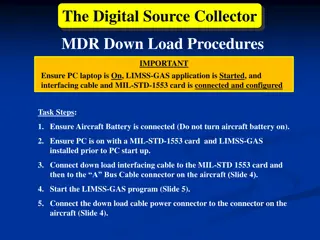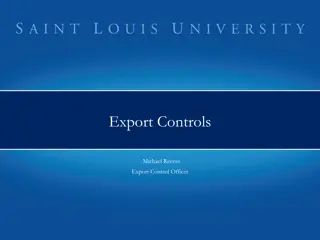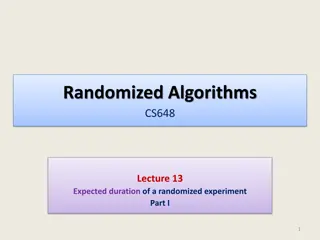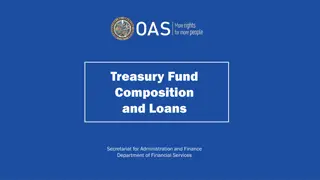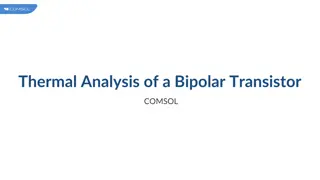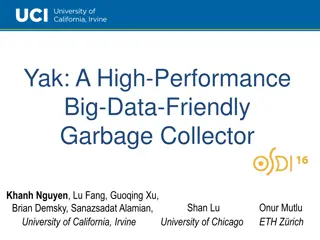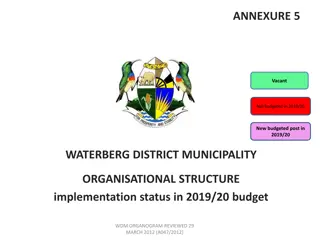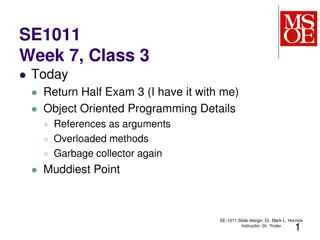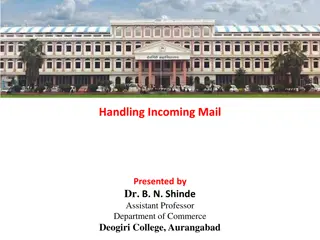Office Operations Best Practices for Treasury and Collector Offices
Enhance office operations efficiency and customer service in treasury and collector offices by implementing best practices such as consistency in routines, posting guidelines, cash control, and handling of abatements, exemptions, and refunds. Maintain a positive and helpful attitude towards customers to create a pleasant experience. Training on established procedures is crucial for all office personnel.
Download Presentation

Please find below an Image/Link to download the presentation.
The content on the website is provided AS IS for your information and personal use only. It may not be sold, licensed, or shared on other websites without obtaining consent from the author.If you encounter any issues during the download, it is possible that the publisher has removed the file from their server.
You are allowed to download the files provided on this website for personal or commercial use, subject to the condition that they are used lawfully. All files are the property of their respective owners.
The content on the website is provided AS IS for your information and personal use only. It may not be sold, licensed, or shared on other websites without obtaining consent from the author.
E N D
Presentation Transcript
OFFICE OPERATIONS & BEST PRACTICES JESSICA MINOT, CMMC TREASURER/COLLECTOR, TOWN OF GRAFTON MINOTJ@GRAFTON-MA.GOV (508)839-5335 ext. 1345 LISA CLARK, CMMT/CMMC TREAUSURER/COLLECTOR LCLARK@HANSON-MA.GOV BARBARA BARRY, CMMC/CMMT, FINANCE DIRECTOR, TOWN OF STURBRIDGE BBARRY@STURBRIDGE.GOV (508) 347-2509
PRACTICE THE GOLDEN RULE BE PLEASANT AT THE WINDOW AND ON THE PHONE & GIVE A SINCERE SALUTATION. MAKE THEM SMILE OR LAUGH IF YOU CAN.
Opening and closing routines should be the same each day. When will interest be charged? i.e. accept postmark, # of days late, $ amount charged. Issue bills on which you control the due dates in a consistent manner. Issue Demand, Notice of Warrant, etc. about the same number of days after the due date. Get notices of bills issued and due dates out in as many media locations as possible. Proofs of mailing when bills are mailed-original notarized and filed with Clerk-copy for your office. Partial payment policy/guidelines-apply 10% rule or not. Refund policy concerning duplicate or over payments especially RE. Consistency Consistency- - Be consistent with your decisions, responsibilities and operations/routines.
Posting guidelines for current, delinquent, & over payments. Procedure to look up research inquires when bill numbers aren t available. Able to explain and calculate all taxes applicable to your community (RE/PP, CPA,MV, etc.) Know the different interest rates for each type of bill issued. Able to explain and calculate interest & late penalties for all types of bills. TRAINING- All office personnel should know and follow established procedures.
Balance posting total to receipts/bank deposit daily. Procedure to balance posted payments to receipts when they don t match. Use an Excel check list instead of an adding machine tape- if not using remote capture. Password protected posting screens unique to each staff person if possible. CASH CONTROL/BALANCING- Establish & follow strict guidelines for accountability. Separate tills for each staff person if can-if not a different person should count till down. Balance monthly with the Accountant. Consider starting year end balancing in May or early June. Balance with your Deputy Collector at least twice a year. Late payments-date stamp the envelope, record type & bill #(s) on it and save. Returned mail-note on screen & try to find new address/owner-maybe BOA or Clerk can help.
Have BOA give MV Excise abatements to you weekly. Have BOA abate qualified unpaid excise bills even if they are over 3 years old. Have preliminary RE taxes reflect prior year exemptions-evens out the payments. ABATEMENTS/ EXEMPTIONS/ REFUNDS Process refunds ASAP after abatements or duplicate payments create credits. RE refunds may be, but do not have to be done, until entire fiscal year s taxes are paid. RE/PP refunds from abatements are to include interest at 8%-Chap. 59: Sec. 69. No MV Excise refunds should be less than $5.00, as that is a minimum abatement allowed. MV Excise refunds only have interest (6%) when the Appellate Tax Board orders the abatement.
MUNICIPAL LIENS- Prepare carefully & check accuracy- mistakes can be costly. Review each one before signing-if only you are doing them prepare one day and review the next. Try to do them weekly or more often if possible, and have same person prepare them.
TAX TITLE/ BANKRUPTCIES/LIENS Do subsequent and Tax Title yearly-very important to be accurate- file taking timely. Mail a Demand bill to the assessed owner-failure to do so may invalidate a Taking. File proofs of claims as quickly as possible-RE taxes are secured- MV generally priority. Be careful not to try and collect pre-petition taxes-flag accounts so demands etc. aren t sent. Remove RMV Marks for renewals-can reinstate with court permission after renewed. RE taxes and 3 years of MV taxes are not discharged unless court permission after renewed. Delinquent utility services are a lien 1 day after the due date-if proper sections were adopted. These liens may be placed on either preliminary or actual RE tax bills.
Chapter 40: Sec. 57- allows denial of application for, or revocation or suspension of any local license or permit for any delinquent taxes, most fees, municipal charges, etc. over the age set in your by-law. DENIAL OF PERMITS & WITHHOLDING OF FUNDS Chapter 60: Sec. 93- Treasurer may & if Collector requests, shall withhold payment of money if payable to any person who owes taxes, assessments, or other charges committed to the Collector.
State Department of Labor Standards enforces this, standards are the OSHA standards. In the office the things you should worry about are trips, falls, and falling weights. Use step stool or ladder; don t climb on furniture to reach things. Make sure that shelves and cabinets are secured so they can t tip over on you. Keep floors clear of trip hazards-no cords snaking across the room. WORKPLACE SAFETY: MGL CHAP. 149, SEC. 6 WORKPLACE SAFETY FOR PUBLIC EMPLOYEES
Your office has PPI in it. Checks- every check has name and banking information on it. Don t keep copies unless you must. Dispose of securely as soon as the need is gone. Excise bills- License numbers aren t required on bills anymore. Old bills and all commitment books will have license numbers listed. Really old stuff could still contain SSN s. Social Security number breaches just got more expensive under the revised law. DATA PRIVACY: MGL CHAP. 93H BREACH REPORTING
MEDIA RELATIONS: WHAT HAPPENS WHEN THE MEDIA CALLS? The time to think about this and talk to your staff is before something big happens. Does your Town have a policy? If no Town policy what is your offices policy going to be?
CONTINUITY OF OPERATIONS: WHAT TO DO WHEN THINGS STOP WORKING? Your Town probably already has a plan for what to do if something big happens. Do you know what it is? That plan doesn t probably cover some smaller stuff. What to do if the printer dies just as you need to print bills? What to do if the network goes down for a few days?
